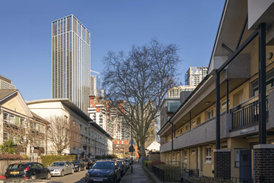Architects face ‘shitty few years’, says leading insurance consultant
Architects are facing “a shitty few years” as professional indemnity insurance becomes even harder to find and premiums go up, the chairman of a specialist dispute resolution firm has warned.
The nine-year extension to the deadline for claims over shoddy work contained in the Building Safety Bill will only make the situation tougher as jittery underwriters anticipate a flood of lawsuits, said Roger Flaxman.
“The insurance market has to a certain extent been taken by surprise by the Grenfell fire and everything that has emerged since about how endemic the risks are to the whole construction process,” he said.

“It’s a hugely unsafe environment for an underwriter – who is not an expert in building but in calculating and taking risk.” Covid and Brexit have only added to the turmoil, he added.
As a result practices have found themselves with premium hikes of as much as 700% or facing fire safety exclusions – if they can find cover at all.
Flaxman, who has been in the business nearly 50 years and is chairman of Flaxmans insurance dispute specialists, said underwriters wanted to see action from the government to minimise the risks.
“The Building Safety Bill doesn’t constitute action because nothing is going to happen in a hurry,” he said.
“Lawyers will see there’s more to argue about and that they have longer to do it and that makes insurers jittery because the lawyers will find something for you to pay. It puts up the price of defending a claim so underwriters will either come out of the business – which a few have done – or exclude the riskiest bit – which is the sign-off of fire safety – or put their premiums up.”
The situation has been exacerbated by modern insurance practice which relies increasingly on algorithms rather than “gut instinct” and specialist knowledge, he said.
“There’s not lots of claims – there’s lots of fear of claims because people think every tower block is going to cost them a fortune,” he added.
Flaxman, who helped set up Wren, the specialist mutual provider, in the 1980s when there were similar problems, said the situation would settle down in two or three more years because “markets normally find ways of levelling themselves out”.
“It’s not going to be a five-minute thing and architects are going to go through a bit of a shitty time. They need to look very hard at the liability of a contract and say ‘we are not prepared to take on liability for things we can’t control’,” he advised.
But he predicted some interesting or even exciting new concepts would emerge in the next few years if “people with authority think outside the box”.
An overseas firm might choose to buck the “lemming” trend and step into the market. But he also revealed he was advising at least two groups exploring specialist solutions to the problem, including a large property developer and the former RIBA president Marco Goldschmied who is trying to establish a mutual PI provider.
“People are very fed up with being pushed around by insurers,” he said. “One minute you’re in business and the next you’re virtually out of business because the insurance market has bled them dry.”
>> Also read: ‘Avalanche of claims’ could distract from effort to reform building safety, architect warns
>> Andrew Mellor: Spiralling insurance premiums are putting architects out of business
>> Also read: Former RIBA president reports ’very strong demand’ for new PI insurance mutual
Lawyers at Trowers & Hamlins, who have been advising on the Hackitt Review and the newly published Building Safety Bill, said that while the new legislation heralds a wholescale culture change for the sector it also presents challenges for construction and could have a significant impact on the insurance market making cover harder to obtain.
Partner Rebecca Rees said the retrospective nature of the changes, the extension of the time to commence claims, plus the obligation on landlords to attempt to recover the cost of remediation work from contractors and designers ahead of leaseholders, were likely to affect premiums as the risk of disputes could increase.
“This may be an unintended consequence of the bill but one that could be borne by the construction industry unless we are prepared to collaborate, share information and work for the benefit of the sector as a whole” she said.
















1 Readers' comment